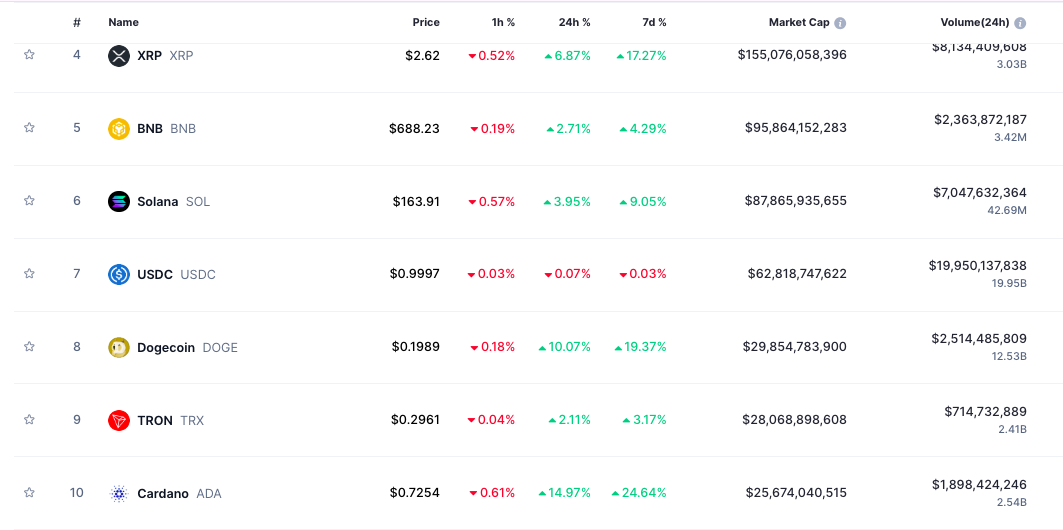Receive free Exchange traded funds updates
We’ll send you a myFT Daily Digest email rounding up the latest Exchange traded funds news every morning.
A little-known Brazilian asset manager has come up with a novel solution that might see it elbow in front of much larger rivals such as BlackRock and Ark to gain approval for the first US spot bitcoin exchange traded fund.
Hashdex’s move attempts to assuage the Securities and Exchange Commission’s concerns around the risk of manipulation in the spot bitcoin market.
While rival applicants such as BlackRock are proposing to establish a “surveillance-sharing agreement” with cryptocurrency exchange Coinbase to detect any potential fraud, Hashdex instead says that the calculation of its ETF’s net asset value would be derived from the CME market’s bitcoin futures curve.
The New York Stock Exchange has filed with the SEC to allow Hashdex to convert its existing NYSE Arca exchange-listed $3mn Bitcoin Futures ETF (DEFI) into a spot Hashdex Bitcoin ETF.
Hashdex’s application comes amid rising speculation that US regulators are about to end their decade-long resistance to the creation of spot bitcoin ETFs — which invest in the “physical” cryptocurrency, rather than futures contracts — since BlackRock, the world’s largest asset manager, filed an application to launch such an ETF in June.
BlackRock’s move ushered in a 21st century-style gold rush as big-name rival managers such as Ark Investment Management, Fidelity, Invesco, WisdomTree, VanEck, Valkyrie Investments and Bitwise refiled their applications to the SEC in the hope that BlackRock’s filing would open the regulator’s door.
The SEC is still reviewing the filings, leaving the industry guessing as to whether or not it will permit any spot bitcoin ETFs, a structure it has objected to on the grounds that bitcoin is traded on unregulated exchanges that may potentially be susceptible to manipulation or fraud.
If the SEC is willing to relent, however, it would mean all these household names could yet be pipped to the post by Hashdex — a Brazilian cryptocurrency house that currently manages just $435mn across Latin America, Europe and the US — less than 1/20,000th of BlackRock’s assets under management of $9.4tn.
DEFI is currently by far the smallest of four bitcoin futures ETFs trading in the US, a structure the SEC has permitted because futures contracts are listed and traded on the Chicago Mercantile Exchange, a regulated market. The SEC believes this arrangement provides enough surveillance to avoid the risk of investors being harmed by criminal activity.
The Hashdex ETF would hold a mixture of bitcoin futures contracts, spot bitcoin and cash. It would buy and sell physical bitcoin via the CME’s Exchange for Physical Transactions, a type of private agreement between two parties to trade a futures position for the underlying asset. These transactions are subject to the CME’s market surveillance.
As such, “any attempt to manipulate the price of the fund would require influencing the futures curve on the CME market”, a market the SEC is happy to let underpin pricing for the existing quartet of bitcoin futures ETFs, the filing said.
Nate Geraci, president of The ETF Store, a financial adviser, described the Hashdex/NYSE proposal as a “brilliant move”.
A second factor crucially important to the filing is that DEFI is structured under the 1933 Securities Act, rather than the 1940 Investment Act favoured by many ETFs, including its rival bitcoin futures funds.
The regulated investment companies structured under the 1940 Act are only permitted to invest in securities, not commodities.
However, the grantor trusts and commodity pools created under the 1933 Act are permitted to invest in commodities, hence ETFs such as SPDR Gold Shares (GLD) are structured under this format.
This is relevant because Gary Gensler, chair of the SEC, has stipulated that bitcoin is a commodity, not a security — even though he believes most other cryptocurrencies are securities.
If the SEC does relent on spot bitcoin ETFs — or is forced to change tack if it loses an ongoing court case with Grayscale, which is suing the regulator for the right to convert its existing Grayscale Bitcoin Trust (GBTC) into an ETF — this could potentially hand an advantage to Hashdex because of its 1933 Act structure.
There is a school of thought that it would be quicker to convert an existing fund to start trading in spot bitcoin than to launch a new vehicle from scratch.
“In the event the SEC approves a spot bitcoin, DEFI can simply convert from futures to physical because its structure allows it to hold either futures or physical assets — as with most commodities ETFs,” said Cinthia Murphy, director of research at the ETF Think Tank, the research division of Tidal Financial Group.
“There are a couple of filings that need to take place for a ‘33 Act to convert, but once approved DEFI could convert to spot next day post SEC approval,” she added.
This option would not be available for other existing bitcoin futures ETFs such as the ProShares Bitcoin Strategy ETF (BITO), Murphy said.
“[19]40 Act funds can’t hold physical assets, only securities, so a conversion isn’t possible. We are likely to see a line-up of ‘33 Act spot bitcoin funds come to market, as opposed to conversions of existing funds due to these regulatory restrictions associated with ‘40 Act funds.”
Being first may prove to be beneficial. BITO, which beat rival products from VanEck, Valkyrie and the Hashdex ETF to market when it launched in October 2021, currently holds $942mn of the $1.01bn in the segment.
However, in this case investors may choose to wait for the launch of similar products from household names such as BlackRock if they believe they will follow on soon after.
Credit: Source link










